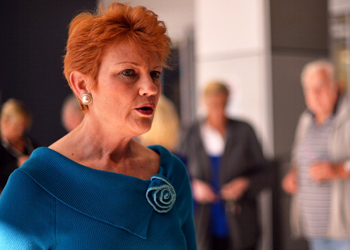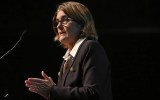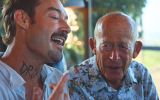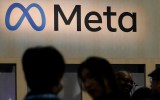

Immigration Minister Peter Dutton’s complaint that illiterate refugees would “take Australian jobs” has pushed election debate to divisive new levels in week two of the election campaign.
In a Sky News interview canvassing the Coalition’s tough border protection policy in the face of a global human displacement crisis, Mr Dutton commented that many refugees “won’t be numerate or literate in their own language let alone English”.
“These people would be taking Australians jobs,” he said.
• Xenophobia the latest weapon in election 2016
• Kisses, backflips and umpires on day nine
• Greens planning to crash the Lib-ALP party
• Hesitant PM refocuses on Shorten
“And for many of them that would be unemployed, they would languish in unemployment queues and on Medicare and the rest of it, so there would be a huge cost, and there’s no sense in sugar-coating that. That’s the scenario.”
Both the remarks and Mr Dutton personally were immediately attacked by Labor leader Bill Shorten, who called on Prime Minister Malcolm Turnbull not to take “the low road” of xenophobia and demonisation of refugees unleashed in an “unconscionable” manner by the Immigration Minister.

“They’re comments Pauline Hanson would have been proud to make,” Mr Shorten said.
Greens leader Senator Richard Di Natale called on the PM to act.
“If Malcolm Turnbull was a true leader, if he genuinely supported the many people from right around the world who have built Australia, he would sack Peter Dutton.”
But in Cairns the Prime Minister unapologetically backed Mr Dutton as compassionate and said that his remarks about refugee numeracy and literacy were accurate “through no fault of their own”.
Describing Australia as the most successful multicultural society in the world, Mr Turnbull said the government’s settlement programs helped newcomers with English language and skills training, social security and health services.
“It’s very expensive, we don’t begrudge the money, but it’s important to get it right.”
Channel Nine political reporter Laurie Oakes said Mr Dutton had achieved two scare campaigns for the price of one: “Stop the boats” and “they’ll take our jobs”.
Feeney fails to disclose

An undisclosed $2.3 million negatively-geared property investment purchased in 2013 by Labor MP and factional powerbroker David Feeney has exposed Labor to charges of hypocrisy.
Mr Feeney, the Labor member for the Victorian seat of Batman, a seat under heavy pressure from the Greens at this election, says he forgot to list the investment on his parliamentary pecuniary interest register.
“That is a lot to overlook,” Mr Turnbull said.
“I’ve expressed to him how displeased I am about this matter. It is unacceptable,” Mr Shorten said when asked by journalists about the matter.
Mr Feeney reportedly corrected the record, and apart from a possible constituent backlash, faces no further censure.
Finance Minister Mathias Cormann seized on Mr Feeney’s embarrassment to accuse Labor of hypocrisy over its plan to axe negative gearing on all but new property in future.
Mr Cormann said Mr Feeney would continue to get the benefit of the tax write off on his investment house’s loan interest payments, a measure to be banned under Labor’s proposed reforms.
Unstimulating: Australia’s record low wage growth

Following this week’s publication of the Reserve Bank board’s latest minutes showing continuing concern about deflation, Australia now has record low wage growth.
On the day the Turnbull government presented its 2016 federal budget on May 3, the Reserve Bank dropped the cash rate to an unprecedented 1.75 per cent.
Now, systemic low wage growth will dampen consumer and household activity for at least another year, raising expectations that the Reserve will drop interest rates to 1.5 per cent before Christmas.
The economy may re-emerge as an election issue on Friday when the PEFO (Pre-election Economic and Fiscal Outlook) is published.
With the Coalition’s election mantra of ‘jobs and growth’, this final report card is expected to confirm there is negligible growth … and not many jobs.
Quentin Dempster is political editor of The New Daily. He has more than 40 years’ experience in print and television (The Sun Herald,The Sydney Morning Herald, ABC TV) and is the author of three critically acclaimed books and a documentary on institutionalised corruption. He also has a Walkley Award and an Order of Australia for an ‘outstanding contribution to journalism’.











